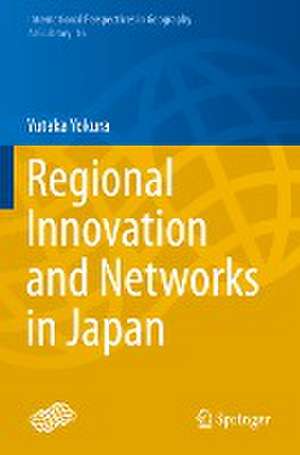Regional Innovation and Networks in Japan: International Perspectives in Geography, cartea 16
Autor Yutaka Yokuraen Limba Engleză Paperback – 31 mai 2022
| Toate formatele și edițiile | Preț | Express |
|---|---|---|
| Paperback (1) | 719.28 lei 6-8 săpt. | |
| Springer Nature Singapore – 31 mai 2022 | 719.28 lei 6-8 săpt. | |
| Hardback (1) | 779.26 lei 3-5 săpt. | |
| Springer Nature Singapore – 30 mai 2021 | 779.26 lei 3-5 săpt. |
Din seria International Perspectives in Geography
- 20%
 Preț: 551.82 lei
Preț: 551.82 lei - 24%
 Preț: 729.72 lei
Preț: 729.72 lei - 20%
 Preț: 555.18 lei
Preț: 555.18 lei - 24%
 Preț: 738.56 lei
Preț: 738.56 lei - 18%
 Preț: 784.79 lei
Preț: 784.79 lei - 18%
 Preț: 727.18 lei
Preț: 727.18 lei - 18%
 Preț: 1010.03 lei
Preț: 1010.03 lei - 18%
 Preț: 727.97 lei
Preț: 727.97 lei - 18%
 Preț: 892.59 lei
Preț: 892.59 lei - 24%
 Preț: 774.88 lei
Preț: 774.88 lei - 24%
 Preț: 724.66 lei
Preț: 724.66 lei - 15%
 Preț: 701.59 lei
Preț: 701.59 lei - 18%
 Preț: 938.83 lei
Preț: 938.83 lei - 18%
 Preț: 885.47 lei
Preț: 885.47 lei - 18%
 Preț: 943.73 lei
Preț: 943.73 lei - 15%
 Preț: 644.95 lei
Preț: 644.95 lei - 15%
 Preț: 644.95 lei
Preț: 644.95 lei - 15%
 Preț: 640.24 lei
Preț: 640.24 lei - 15%
 Preț: 649.06 lei
Preț: 649.06 lei - 15%
 Preț: 642.51 lei
Preț: 642.51 lei
Preț: 719.28 lei
Preț vechi: 877.17 lei
-18% Nou
Puncte Express: 1079
Preț estimativ în valută:
137.68€ • 149.60$ • 115.72£
137.68€ • 149.60$ • 115.72£
Carte tipărită la comandă
Livrare economică 21 aprilie-05 mai
Preluare comenzi: 021 569.72.76
Specificații
ISBN-13: 9789811621932
ISBN-10: 9811621934
Ilustrații: IX, 127 p. 47 illus., 19 illus. in color.
Dimensiuni: 155 x 235 mm
Greutate: 0.2 kg
Ediția:1st ed. 2021
Editura: Springer Nature Singapore
Colecția Springer
Seria International Perspectives in Geography
Locul publicării:Singapore, Singapore
ISBN-10: 9811621934
Ilustrații: IX, 127 p. 47 illus., 19 illus. in color.
Dimensiuni: 155 x 235 mm
Greutate: 0.2 kg
Ediția:1st ed. 2021
Editura: Springer Nature Singapore
Colecția Springer
Seria International Perspectives in Geography
Locul publicării:Singapore, Singapore
Cuprins
Introduction.- Regional Innovation and Knowledge Creation.- R&D Networks and Regional Innovation.- Local Trade Fairs as Temporary Clusters: A Case Study of the Suwa Area Industrial Messe.- Informal Networks and the Evolution of Industry: A Case Study of the Hamamatsu Area.- Institutional Thickness in Regional Innovation Ecosystem: A Case Study of the Kyushu Semiconductor Industry.- Global Knowledge Flows and Corporate Values.- Conclusions.
Notă biografică
Yutaka Yokura is an associate professor in the Faculty of Economics at Kyushu University, Japan. In 2009, he received his Ph.D. from The University of Tokyo, where he worked as an assistant professor between 2010 and 2015. In 2016, he became an associate professor at Shizuoka University. His research interests lie in economic geography, especially industrial agglomerations theory and the innovation process. His book titled Sangyo Shuseki no Network to Innovation (Industrial Agglomerations, Networks and Innovation) received a writing award from the Japan Association of Economic Geographers in 2019. He is a member of the editorial board of the Annals of the Association of Economic Geographers.
Textul de pe ultima copertă
This book provides a novel perspective on networks and innovation in the field of economic geography and presents new findings through theoretical foundations and empirical analyses. The book focuses on various temporary systems in industrial agglomerations such as joint R&D, trade fairs, business workshops, and international conferences. Following the introduction, Chapter 2 considers the mechanism of the innovation process in which networks function as institutions. Chapter 3 and succeeding chapters conduct empirical research centered on statistical data analysis such as social network analysis and covariance structure analysis, and they determine the real-world situations through interview surveys of related stakeholders. Chapter 3 considers the structure and spatial patterns of R&D networks in Japan by making the structure visible and calculating network indices. Chapter 4 concentrates on local trade fairs held in industrial agglomerations and examines the development of various relationships between related participants. Chapters 5 and 6 shed light on institutional thickness in industrial agglomerations. Chapter 7 spotlights quantitative and metrical examinations of inter-organizational relationships in terms of knowledge flows based on company-level data regarding technological alliances and ownership relationships between global corporations. The studies featured in Chapters 6 and 7 serve to evaluate how Japan’s firms have adapted to radical changes under global competition.
Caracteristici
Shows how to use social network analysis Covers innovation and network theory Provides numerous original network maps
